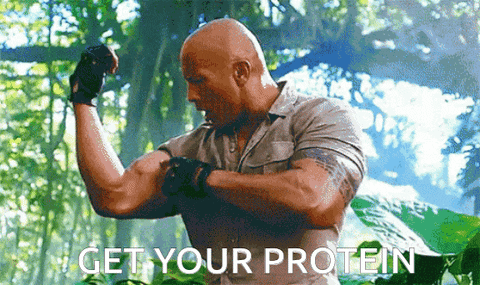- The Daily Tonic
- Posts
- Meat is essential for warding off depression and anxiety.
Meat is essential for warding off depression and anxiety.
Plus: The “protein leverage” hypothesis and why it matters.
Thursday. The teen babysitter is all but extinct (according to THIS ARTICLE by The Atlantic). Babysitting used to be both a way to make a few bucks and a rite of passage. It was a small step toward adulthood for American teens, especially teen girls. Today, teen girls are too anxious and busy scrolling on TikTok to bother taking care of your kids. Oh, how times change.
Speaking of times changing, there is a surprising new development in the contentious battle of “Is meat healthy or is it bad for you?” Let’s dive in.
DEEP DIVE
Sorry, Vegans (Seriously, Don’t Be Mad)
We’ve brought up mental health a lot over the past few months because it’s, unfortunately, a growing problem in the U.S. that isn’t getting as much attention as it should. We need to do better, which is why the conversation around diet and mental health is more critical than ever.
This brings us to Dr. Georgia Ede—a nutritional and metabolic psychiatrist with training from Harvard, whose work highlights the often-overlooked importance of meat in our diet, especially when talking about our mental well-being (YOU CAN READ HER FULL PIECE HERE).
With increasing numbers of people embracing a more plant-based diet because of its perceived health benefits, Dr. Ede’s insights come as a bit of a surprise (and a controversial one at that). She points out that, contrary to popular belief, meat is crucial for brain health. It is packed with essential nutrients like zinc, vitamin B12, and choline, which significantly impact our mental health and are hard to find in vegan diets.
The debate on meat versus plant-based diets is nothing new, but Dr. Ede’s arguments bring a different perspective, especially in the context of mental health. Usually, when it comes to this debate, most experts on either side fixate on cardiovascular health, cancer risk, or the ability to get sufficient protein. No one is really talking about the connection between meat and mental health.
She acknowledges that while one can meet protein needs through careful planning on a vegan or vegetarian diet, the real challenge lies in getting other critical nutrients abundant in meat. These nutrients, including omega-3 fatty acids, iron, and iodine, are pivotal in maintaining optimal mental health, aiding in everything from mood regulation to cognitive function.
And here is the thing—recent studies lend weight to Dr. Ede’s claims, revealing a concerning link between meat-free diets and adverse mental health outcomes. Research spanning 18 studies involving over 160,000 participants found that diets devoid of meat were associated with a higher incidence of depression and anxiety (READ THE STUDY HERE).
Eighteen studies and 160,000 isn’t exactly a small sample size. We can’t ignore the fact that there is clearly a connection here, especially when considering the growing prevalence of mental health issues among the younger population.
And this stuff isn’t just about individual health choices. If the connection between meat and mental health is as strong as it seems, then there are much broader public health implications here we need to think about. With diet-related diseases on the rise, understanding the full impact of our dietary choices is important. While vegan diets are touted for their benefits, ranging from weight loss to reduced cancer risk, the potential nutritional deficiencies and their implications on mental health cannot be ignored.
The key takeaway? Any diet that is too restrictive is going to be missing key nutrients your body needs. That goes for vegans and carnivores alike. If you feel strongly about following a plant-based diet and it works for you, great! There is no one-size-fits-all solution to nutrition. There are guiding principles we should all follow to optimize our nutrition and health, but at the end of the day, there are many different ways to get there.
Here is what matters—as you navigate these choices around your nutrition, it’s essential to weigh the benefits and drawbacks carefully, ensuring that your pursuit of physical health doesn’t come at the expense of your mental well-being. Whether it’s embracing a balanced diet that includes meat or finding ways to supplement a plant-based diet with essential nutrients, the goal should always be to support both our physical and mental health—not just one or the other.
OUR PICKS
Tonic Shots
FROM THE ARCHIVE
“Protein Leverage” And Why It Matters

It’s no secret that we have a weight management problem in the U.S. We have talked about the rising obesity rates here many times before, and it is one of the main reasons new weight loss drugs like Ozempic and Wegovy have gained so much popularity over this past year. But have we really peeled back the layers of this problem yet so that we can understand why we collectively struggle with weight gain as a society here in the U.S.?
One possible explanation is the "protein leverage" hypothesis. It puts forth a relatively simple yet compelling idea — humans might eat more when the protein content in their diet is low, especially with the type of access we have to processed foods today. This behavior, researchers suggest, could be a major reason behind the rising obesity epidemic.
At its core, the hypothesis points out an intriguing behavioral pattern seen in humans and many other species: we seem to prioritize protein intake over other dietary components. This makes sense, given that proteins are our bodies' literal building blocks.
This is why it’s suspected that when there's a decrease in protein content in our diet, there's a corresponding increase in our total food intake. Consider it: modern diets, chock-full of carbs and fats but low on protein, could make us consume extra calories. Our bodies might be constantly searching to meet their protein requirement, even if that means eating more calories than necessary.
The result? Unwanted weight gain.
SUPPORT US
Support Our Team 🧡
We're all about making your journey towards better health enjoyable and insightful. By becoming a member of The Daily Tonic family, you're not just supporting us, you're elevating your own wellness journey!
We believe in the power of community and the impact of your support. Your membership helps us continue delivering the best health and wellness newsletter around. If you enjoy starting your day with a dose of wellness wisdom from The Daily Tonic, consider joining us as a member.
🌿 Continue Reading
This is the web version of The Daily Tonic.
Subscribe to get full access to all our newsletters with more subscriber-only content. Get science-backed health news and stories straight to your inbox. See you there 📬
